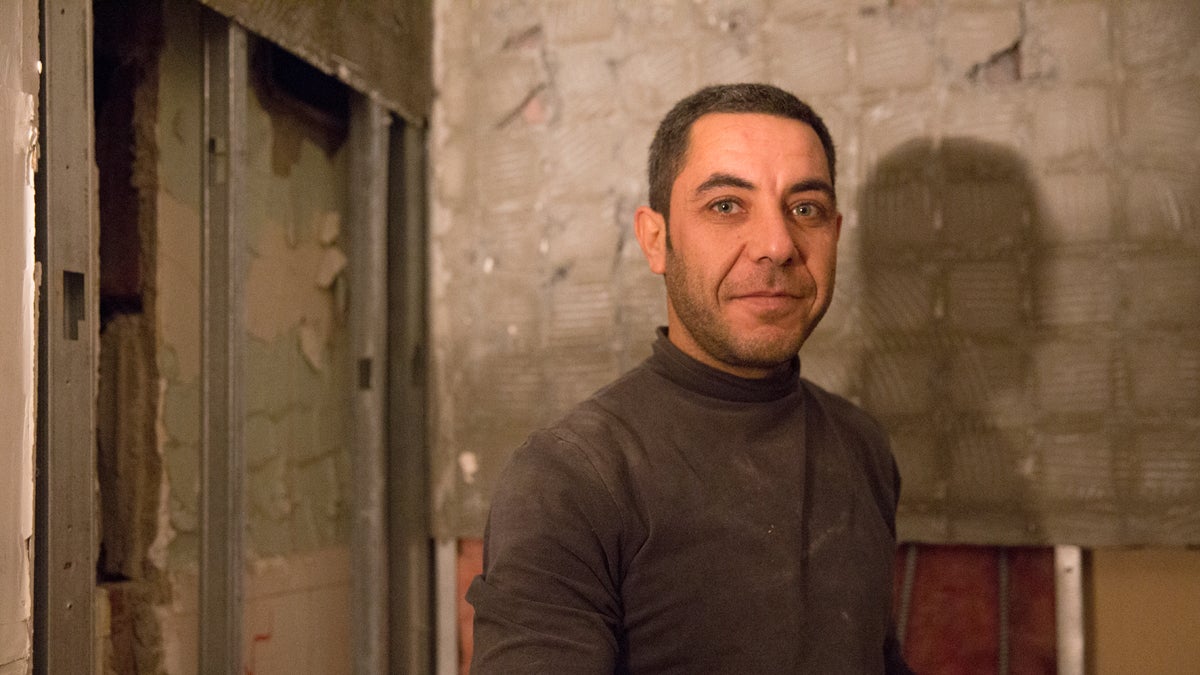EXPLAINER: How do Syrian refugees come to Pennsylvania?

Japour Ibrahim, a Syrian refugee, said he came to Allentown with his family in April 2015. There he found work helping to restore the Americus Hotel in Center City, Allentown. (Lindsay Lazarski/WHYY)
With terrorism in the headlines, Syrian refugees escaping a multi-sided civil war have become the political football du jour in the region.
New Jersey Gov. Chris Christie said he would bar all of them, even orphans younger than 5. Gov. Tom Wolf’s administration said in a statement that Pennsylvania would remain open to people fleeing “unimaginable terror.”
With terrorism in the headlines, Syrian refugees escaping a multi-sided civil war have become the political football du jour in the Delaware Valley and beyond.
To clear up some of the questions and concerns raised by recent terrorist attacks in Paris and the Middle East, NewsWorks spoke with some refugee resettlement experts about the process in general, and what it means specifically for folks who settle in our area.
The number of Syrian refugees arriving is very, very small
More than 4 million people have fled Syria since the outset of what is now a civil war, and millions more are displaced internally.
For every hundred or so who apply for refugee status through the United Nations, two or three will be referred to the U.S. refugee program, according to Janet Panning, program director with Lutheran Children and Family Services, a refugee resettlement organization in Philadelphia.
After siphoning off this small percentage of would-be refugees, the State Department begins an intense, interdepartmental vetting process. So far, the U.S. has accepted 2,200 refugees from Syria since the start of the current conflict, according to Kevin Appleby, director of migration policy at the U.S. Conference of Catholic Bishops.
Since October 2012, 138 Syrian refugees have settled in Pennsylvania, spread out over five metro areas and 20 small towns, said a spokeswoman for the state Department of Human Services. New Jersey has accepted 75 so far this year, even as Gov. Christie joined Republican governors calling for an end to the resettlements.
On average, background checks take two years
“Every intelligence agency in the U.S. is engaged in screening these people,” said Lavinia Limon, president of the U.S. Committee for Refugees and Immigrants. “That processing time is averaging two years.”
That’s two years of living in a refugee camp or temporary settlement.
What kinds of screenings exactly? For starters, the U.S. fingerprints and takes other biometric information from refugee applicants, and checks that information against databases and watchlists from the various intelligence agencies. Department of Homeland Security investigators also interview potential refugees, and then fact-check the details of their stories, Panning said. That’s only a few of the checks done, early in the process.
Thanks to the Patriot Act, refugees must also demonstrate that they have never given material support to anyone trying to overthrow an existing government, said Panning.
For example, she said, “If you are an ethnic minority and you gave a bowl of soup to your uncle who tried to change the government to a more democratic government, you are ineligible.”
And the background checks don’t stop when refugees arrive in the U.S.
After a year here, refugees may apply for a green card. That initiates another round of checks, this time pertaining to a refugee’s activity since arriving.
The people we get are the most vulnerable
It’s easier to get refugee status if you are old, young or sick.
Part of the U.S. criteria for who is acceptable in the refugee program is “people who are at most risk,” said Limon. Locally, that has meant families with small children, many of whom lived in refugee camps in Jordan or Lebanon for years prior to getting clearance to move to the U.S.
They go where there is capacity, and sometimes a pre-existing cultural community
While the vetting process takes place overseas, refugee organizations submit proposals on who and how many they can take. Deciding factors include affordable housing, public transit, strong social service agencies and amenable employers, all of which support refugees in hitting the ground running.
An established group of immigrants from the same country can also be seen as an asset, hence new settlement of Syrians in Allentown, Pennsylvania, and Paterson, New Jersey, and Liberians in Southwest Philadelphia.
In total, nine organizations with 400 sites fanned out across the country resettle the refugees. Once on the ground, they receive government assistance, but the runway is short.
“There’s not much of a safety net so they need to get employed as soon as possible,” said Panning, who said federal aid for expenses such as rent runs out in less than six months, although refugees may continue to access other social services for five years. Many refugees take jobs much lower than their accreditation or professional degrees, and refugee organizations work with job developers to find employers who will hire newcomers.
“It’s brutal initially, but I think it’s a really good process that we have because you have people that are invested in becoming citizens,” she said.
WHYY is your source for fact-based, in-depth journalism and information. As a nonprofit organization, we rely on financial support from readers like you. Please give today.

